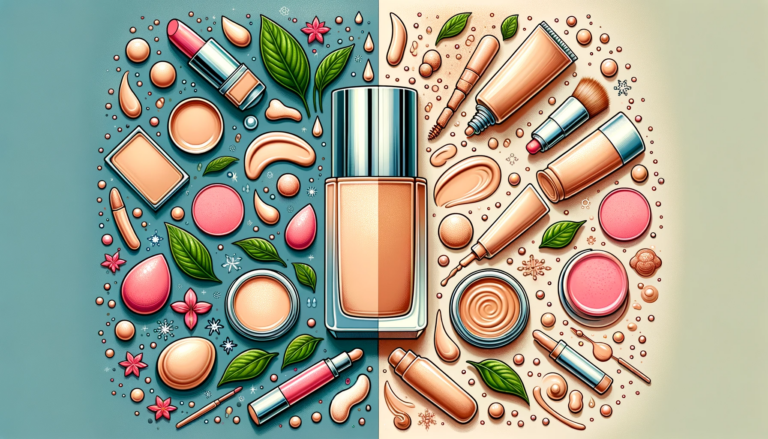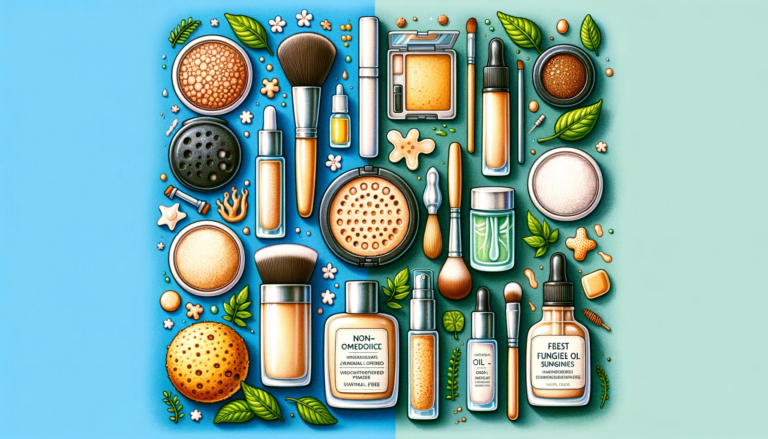How Biotin Causes Acne and Breakouts?
Wondering how biotin, the celebrated supplement for hair, skin, and nails, might be the culprit behind your sudden acne breakouts?
Biotin’s dark side is an unexpected twist for many, as this beauty booster could be causing more harm than good to your skin. Navigating the complex world of supplements reveals that even the most praised vitamins, like biotin, have their drawbacks.
With an increasing number of individuals reporting acne after starting biotin, it’s time to delve deeper into this issue.
Well, we’ll be going over:
- How does biotin interact with your body to potentially cause acne?
- What role does biotin play in the balance of skin oils and bacteria growth?
- Are there ways to manage or prevent acne caused by biotin intake?
Let’s dive in.

What is Biotin?
Biotin, also known as Vitamin B7 or Vitamin H, plays a crucial role in your body’s metabolic process. It helps convert food into energy and is vital for the health of your hair, skin, and nails. You might be taking biotin supplements to bolster your hair growth or improve your skin’s appearance, trusting in its well-advertised benefits.
However, what’s not often discussed is how this vitamin interacts with your body beyond hair and nail support. Found naturally in foods like eggs, milk, and bananas, biotin is generally safe when consumed in recommended daily amounts. Yet, when you introduce higher doses through supplements, you might inadvertently trigger skin issues, specifically acne.
The underlying mechanisms aren’t completely understood, but it’s thought that excessive biotin can disrupt your skin’s natural balance. This imbalance is what potentially leads to the skin problems you’re experiencing, making you reconsider everything you thought you knew about the so-called beauty vitamin.
The Connection Between Biotin and Acne
Discovering the link between biotin and acne might startle you, especially when considering biotin’s widespread acclaim for bolstering hair and nails. However, this correlation stems from how biotin influences your body’s metabolic processes. Biotin is essential for breaking down fats, carbohydrates, and proteins, but when you intake high doses, it may tip the scales of your skin’s natural environment.
Your body’s delicate balance between biotin and vitamin B5 plays a pivotal role in skin health. Both vitamins compete for absorption in the intestines. An excess of biotin can lead to a deficiency in vitamin B5, a nutrient crucial for maintaining the skin’s barrier against irritants and reducing inflammation. When your skin lacks sufficient vitamin B5, you’re more susceptible to developing acne.
Moreover, biotin supplements can trigger flare-ups in those predisposed to acne. The surplus of biotin in your system can prompt your skin to produce more oils, making it a fertile ground for breakouts. Understanding this connection empowers you to make informed decisions about supplementing with biotin and managing your skin’s health.
Biotin and Hormonal Changes
When you start supplementing with biotin, it’s not just the metabolism of fats, proteins, and carbohydrates that gets affected. An often overlooked aspect is how biotin can influence hormonal changes in your body, potentially leading to acne outbreaks. Hormones play a pivotal role in the health of your skin, and any imbalance can trigger issues such as increased oil production, clogged pores, and acne.
Biotin’s impact on hormones isn’t direct but rather a side effect of its role in the body’s metabolic processes. By affecting these processes, biotin supplementation can indirectly alter hormone levels, particularly those that are closely linked to the skin’s oil production. For individuals with a sensitivity to hormonal changes, even a slight imbalance can be enough to contribute to acne development.
Understanding the link between biotin, metabolism, and hormone balance is crucial. If you’re experiencing unexpected skin issues after starting a biotin supplement, considering the hormonal aspect is a wise step in managing your skin’s health.
Biotin and Increased Oil Production
When you supplement with high doses of biotin, it can lead to an unexpected side effect: increased oil production. Your skin naturally produces oil through sebaceous glands, which plays a crucial role in keeping it hydrated and protected. However, an excess of this oil is a common contributor to acne development.
Biotin’s impact on your skin’s oil production is tied to its role in the metabolism of fats and carbohydrates. By enhancing the metabolic processes, biotin can inadvertently cause your sebaceous glands to produce more oil than necessary. This increased oil can clog pores, trapping bacteria and dead skin cells, which often exacerbates or leads to the development of acne.
Understanding how biotin influences your body’s oil production helps in managing its intake to avoid unwanted skin outcomes. Opting for natural food sources of biotin, like eggs, almonds, and sweet potatoes, may help maintain a balance that supports skin health without overstimulating oil production.
Biotin and Bacterial Growth
When you’re exploring how biotin might be contributing to your acne, it’s crucial to consider its relationship with bacterial growth. Biotin can indirectly exacerbate the proliferation of acne-causing bacteria on your skin. This happens because an overproduction of oil, induced by high levels of biotin, creates an ideal breeding ground for bacteria.
Your skin naturally harbors a variety of bacteria, including Propionibacterium acnes, which plays a direct role in acne development. Under normal conditions, this bacteria lives harmlessly on your skin. However, when oil production increases, it provides more food for these bacteria, allowing them to multiply rapidly. This overgrowth can lead to inflammation and, consequently, acne.
Moreover, excess biotin can disrupt the delicate balance of your skin’s microbiome, the community of microorganisms that live on and protect your skin. By altering this balance, biotin can weaken your skin’s defenses against harmful bacteria, making it easier for infections to take root and potentially leading to more severe acne outbreaks.
Managing Acne Caused by Biotin
If you’re noticing breakouts that might be linked to your biotin intake, there’s a strategy to balance your health without sacrificing your skin. First, assess the amount of biotin you’re consuming. Whether it’s through your diet or supplements, understanding your intake can help pinpoint the cause.
Incorporate biotin-rich foods naturally in your diet rather than heavily relying on supplements. Foods like eggs, nuts, and whole grains provide a balanced amount and also come with other essential nutrients that support skin health.
Keeping track of your skin’s reaction as you adjust your biotin intake is crucial. Reduce your biotin supplement dosage gradually, and observe if there’s an improvement in your skin condition. During this period, maintain a consistent skincare routine that focuses on gentle cleansing and moisturizing to help your skin recover.
Hydrate adequately and consider adding foods rich in Vitamin B5 to your diet. This vitamin works in tandem with biotin and can help mitigate acne by maintaining the skin’s natural barrier.
Conclusion
Understanding the link between biotin and acne is crucial for maintaining your skin’s health. While biotin plays a vital role in your body’s functions, it’s important to balance its intake, especially from supplements, to avoid triggering acne outbreaks.
Opting for natural sources of biotin and adjusting your diet to include Vitamin B5-rich foods can be beneficial. If you’re noticing breakouts, consider reassessing your biotin consumption and adapting your skincare routine to support your skin’s recovery.
Remember, gentle cleansing, moisturizing, and staying hydrated are key to keeping your skin clear and healthy. By taking these steps, you’ll be better equipped to manage biotin levels and minimize the risk of acne, ensuring your skin remains vibrant and radiant.






